We’re looking at how we can help save hedgehogs – one of Wales’s much-loved creatures
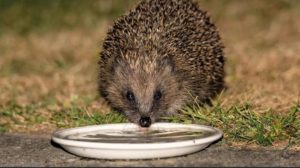
Photo credit: Pembrokeshire Hogspital
They may not be cuddly (ouch), but they’re certainly very cute. Sadly, one of Wales’s much loved creatures, the hedgehog, is vulnerable to extinction. So what can we do to help our spiky friends? As part of Wales Nature Week which is being celebrated from the 22nd – 30th July, here are some ‘pointers’ (ahem) from our friends at the Pembrokeshire ‘Hogspital‘:
1. Check before you strim or mow
This time of year we’re all out in our gardens, but it is also breeding season for hedgehogs. Their nests are usually made of leaves, dead grass or foliage and can be extremely well-hidden. Hogs are frequently injured or killed by strimmers or mowers, so it’s best to check an area carefully before you start work.
2. Pick up netting at least 30cm off the ground
Hogs can become tangled in netting from football goals and vegetable gardens. To avoid this, pick up the netting after use or keep it 30cm off the ground to avoid entanglement. If you find a hog entangled in netting, contact the Pembrokeshire Hogspital – injuries from netting can cause skin to breakdown days after the incident.
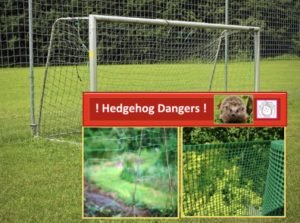
Ensure any netting such as football goals are lifted 30cm from the floor to avoid hogs getting tangled
3. Provide a shallow water dish
The hot weather we have been experiencing has meant hedgehogs are unable to find safe places to drink. A water station can be provided in your garden, for hogs and other wildlife to use. Ensure that the bowl is shallow and top it up regularly with fresh clean water.
4. Provide a hog home!
Hedgehogs must find a safe, sheltered place to rest, give birth in the spring, and hibernate in the autumn. Artificial hog homes are a great addition to your garden and provide a designated safe area for hogs to nest away from human activity. More information and tips can be found on the RSPB site here.
You can even provide hedgehogs with suitable bedding for their new abode. Dust extracted barley straw or dried leaves are best. You can leave some bedding outside the box to encourage the hog to nest naturally. Clean the box after hibernation in April by emptying and rinsing with boiling water (ensuring you check for inhabitants first)!
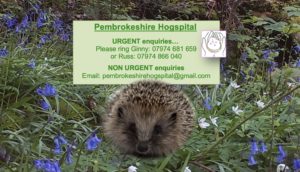
The Pembrokeshire Hogspital
5. Feed stations
Feed stations can be provided to supplement a hog’s natural diet at times of drought and to help them gain weight in autumn to hibernate. Studies have shown that feeding doesn’t interrupt the natural foraging of hedgehogs, instead acting as a supplement when less food is available.
The best way to provide food to a hog is at a covered, predator-proof station. It should have two entrance/exit holes to ensure they don’t get trapped inside by a dominant hog. The holes should be around the same size as a CD or DVD, and you can even attach a tunnel or pipe to the box to prevent predators such as cats or foxes. A removable or hinged lid is advised for cleaning and replacing food.
Hedgehogs have set territories so more than one station will help to avoid any aggression.
Try not to place the feed station close to the hog home, this reduces the risk of predators finding nesting or hibernation sites. Find out more here.
Once you have your food station set up, what do you feed them?
You can feed hedgehogs with specially made wild hedgehog food or meaty dog or cat food (no gravy).
Avoid bread, milk, mealworms, gravy, and fruit, as these are not good for a hedgehog’s digestion.
6. Create a bug corner
Hedgehogs naturally feed on invertebrates like earthworms and beetles. You can encourage more natural hedgehog food to enter your garden by creating log or stone piles or leave a corner of the garden to grow, to benefit creepy crawlies.
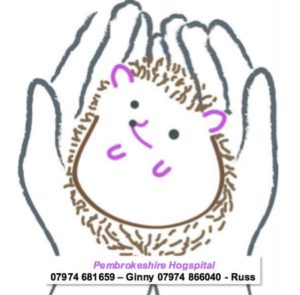
Useful information, tips and advice can be found on the Pembrokeshire Hogspital Facebook page
7. Work with neighbours to create a ‘hedgehog highway’
If you want to encourage hedgehogs into your garden, you may need to create an opening or gap in the fence to allow safe entry. Encouraging neighbours to do the same will help to create a network of gardens and provides you with a natural bug removal service!
8. Avoid the use of pesticides or slug pellets
Pesticides work by poisoning invertebrates, if hedgehogs or other animals ingest these they will also be affected. Hedgehogs have also been known to ingest slug pellets that are left at the base of plants, some natural alternatives are available.
9. Create a ramp if you have a steep sloped pond
Ponds are fantastic editions to a garden, which attract a wealth of wildlife. Hedgehogs are great swimmers, but they can get into difficulty if the edge of the pond is steep. Many hogs drown each year as they can’t escape. When building your pond, make it shallower one side or add stones or logs so that a hedgehog can climb out. Monitor your pond regularly to check that the water level is also not too low for animals to escape.
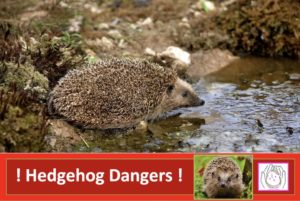
Adapt your pond to make it safe for hogs
10. What to do if you find a hedgehog
Hedgehogs make for a fantastic wildlife encounter. By observing the animal, you can check whether it is healthy or needs a helping hand.
If a hedgehog is severely injured, it should be taken straight to the nearest vet. To transport the animal safely, use gardening gloves to place it in a high-sided, ventilated box with a towel/straw/shredded newspaper.
Sometimes hedgehogs are underweight, have parasites or injuries and require a little TLC from specialists like the team at Pembrokeshire Hogspital. If it looks lethargic, wobbly or is attracting flies there is usually something wrong. If you think a hedgehog is unwell in Pembrokeshire, you can call Ginny on 07974681659 or Russ on 07974866040.
Hogs are nocturnal meaning they are normally active after daylight hours. If you see one out during the day, it is also an indicator it is unwell. The only exception to this is a nursing mother – a mother will be moving around with purpose from one location to another, sometimes carrying nesting material in her mouth.
If you’d like to donate items, contribute to the Pembrokeshire Hogspital or find out more, visit their Facebook page.
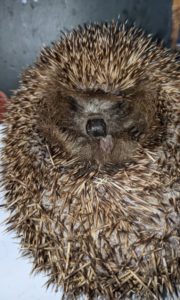
Help look out for our spiky friends this Wales Nature Week